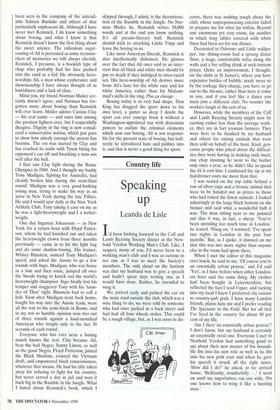Country life
Speaking up
Leanda de Lisle
I'd been looking forward to the Calf and Lamb Rearing Society dinner at the New- bold Verdon Working Man's Club. Like, I suspect, many of you, I'd never been to a working man's club and I was as curious to see one as I was to meet the Society's members. The only cloud on the horizon was that my husband was to give a speech and hadn't spent days writing one as I would have done. Rather, he intended to Wing it.
We arrived early and parked the car on the main road outside the club, which was a wise thing to do, we were told by someone who had once parked in a back street and had had all four wheels stolen. This could be a rough village, but, as I was soon to dis-
cover, there was nothing rough about the club, whose unprepossessing exterior failed to prepare me for what lay within. Beyond one enormous yet cosy room, lay another in which long tables covered with white linen had been set for our dinner.
Decorated in Osborne and Little wallpa- per, our dining-room had a sprung dance floor, a stage, comfortable sofas along the walls and a bar selling drink at rock-bottom prices. Quite an improvement, I thought, on the clubs in St James's, where you have expensive bottles of bubbly, made more so by the corkage they charge, you have to go out to the theatre, rather than have it come to you, and if you feel like a dance you must join a different club. No wonder the workers laugh at the rest of us.
However, while the members of the Calf and Lamb Rearing Society might now be earning rather less than the average work- er, they are in fact yeoman farmers. They were here to be thanked by my husband and others for raising animals that were then sold on behalf of the hunt. Kind, gen- erous people who joked about the difficul- ties they were having in making ends meet, one chap insisting he went to the barber only once a year, as he didn't like to spend the 16 it cost him. I confessed the tip at my hairdresser costs me more than that.
I was seated on the top table behind a row of silver cups and a bronze animal that were to be handed out as prizes to those who had raised the finest animals. I looked admiringly at the large black bottom on the bronze and said what a wonderful bull it was. The man sitting next to me pointed out that it was, in fact, a sheep. 'You've been spending too much time in London,' he teased. 'Hang on,' I retorted, 'I've spent two nights in London in the past four months.' But, as I spoke, it dawned on me that this was two more nights than anyone else in the room had spent there.
When I met the editor of this magazine over lunch, he said to me, 'Of course you're an essentially urban person,' and I'd said 'Yes', as I have before when other London- ers have said the same thing. My clothes had been bought in Leicestershire, but reflected the fact I read Vogue, and tucking into my food I knew I preferred city cuisine to country-pub grub. I have many London friends, plants hate me and I prefer reading The Spectator to the Field. But for all that I've lived in the country for about 90 per cent of my life.
Am I then 'an essentially urban person'? I don't know, but my husband is certainly an essentially rural one. Everyone I met in Newbold Verdon had something good to say about their new master of fox hounds.
He fits into his new role as well as he fits into his new pink coat and when he gave his speech it struck all the right notes.
'How did I do?' he asked, as we arrived home. 'Brilliantly, wonderfully ...' I went on until my superlatives ran out with, 'No one knows how to wing it like a hunting man.'


























































































 Previous page
Previous page